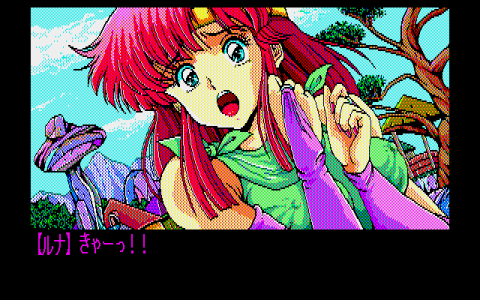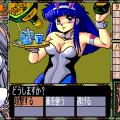In the later half of 1980s, the Japanese adult game market was still relatively unexplored, and the number of companies trying their hand at it was increasing. Text adventure games were the norm, and there wasn’t a lot of effort made to change that. They were easier to make and the quality wasn’t that important, since they would sell for the porn anyway. And that’s how people saw them as, porn games and nothing else, so any effort to make good games seemed pointless. But in 1989, a couple of friends around main designer/writer Masato Hiruta became tired of working for other erotic game companies and founded Elf to try something different. The idea was simple: Make a Wizardry-like game, but full of cute girls and tons of nudity. The result was Dragon Knight.
An erotic RPG still a novelty at the time – after some early crude attempts by KOEI in the early 1980s, ASCII’s Chaos Angels and Alicesoft’s Rance where the only titles that preceded it and those had much lower production values, so Dragon Knight‘s impact was a lot stronger than one would expect from a simple Wizardry clone.
Masato Hiruta is commonly known as the man who created the hugely popular series Doukyuusei, and other famous works like Nonomura Byouin no Hitobito, a game that ended up being one of the best selling games on the Saturn in Japan. But Dragon Knight was the first title to bring Elf into the spotlight, and might just be his most important contribution to the industry, as it was the first time an erotic game got popular enough to attract the attention of regular video game fans.
The story begins with the swordsman Takeru Yamato arriving at Strawberry Fields, a country only inhabited by beautiful women. He soon meets Luna who, after witnessing his skill with a sword, asks for his help in saving the land from danger. Takeru has an audience with the queen, who tells him the Water Goddess that looked over the country has been sealed by the Dragon Knights, who then proceeded to steal the six jewels she protected and invaded the Goddess’ Tower. Fearing for the safety of her people, the queen ordered a group of warriors to retrieve the jewels, but every single one ended up captured in the tower. The Dragon Knights then demanded intructions on how to use the jewels, and the queen has to oblige if she doesn’t want to see the warriors get killed. It is now Takeru’s job to get the six jewels back and save the captured knights, which he accepts on the condition that the queen grants him one wish.
Characters
Takeru Yamato
The main character, a swordsman travelling around the world looking for adventure. He is a bit of a pervert, but also happens to be a nice person who likes to help others. Voiced by Akira Kamiya in the PC Engine version.
Luna
The main heroine, she’s the one that introduces Takeru to the queen and first asks for his help in saving the kingdom. Voiced by Noriko Hidaka in the PC Engine version.
Luusa
Luna’s mother. She works in the temple and is the main source of healing in the game. Her name is only revealed in Dragon Knight III. Voiced by Rei Sakuma in the PC Engine version.
Neina
The Queen. She promises Takeru to grant him one wish if he manages to save the Goddess and retreave the jewels. Like Luusa, her name is never revealed in the first game. Voiced by Chieko Nanba in the PC Engine version.
The first Dragon Knight is a rather simple dungeon crawler. It only has one town and a six-floor dungeon, so it’s far from being a long RPG, but players were still getting a lot more playtime for their money compared to other erotic games at the time. Takeru is the only playable character, and he can fight against up to six enemies at once. His available actions consist of a physical attack, two magic spells (one for attacking and the other for healing) and running away. The magic attack is mostly useless, due to its high MP cost and low attack power (although it does hit all enemies), and running away has a high probability of failing, so the only viable strategy for every battle in the game is using physical attacks and healing when low on HP. The game balance is also what you’d expect from a 1989 RPG, with grinding being essential during several parts of the game, especially at the very beginning.
But while the battles are uninteresting, the game makes up for it with the exploration. The main objective while exploring the tower is to beat the Dragon Knights in each floor and get back the jewels they have in their possession. To do this, Takeru first needs to get the password to their rooms, which usually involves saving some of the warriors and figure out where to go next based on the hints they give. To complete the dungeon the player has to find hidden passages, solve puzzles, and even do fetch quests. There’s also no automap feature, so drawing maps manually is the only way to document the confusing floor layouts, and the game’s manual even comes prepared with graph pages for all floors. Thankfully, drawing maps is made a bit easier by virtue of having your current X and Y position available at all times, as well as the direction you’re facing. Keeping notes of the hints NPCs give you is also of great importance, as they won’t repeat them for you.
In a time where most erotic games still didn’t look very good, Dragon Knight was one of the few that featured high quality anime style art and competent CG work. It only uses 8 colors, so some of it is quite impressive for the limited palette. Not to mention the music, which was also better than what most players were used to in eroge, and the effort that went into making the soundtrack is apparent. Each floor of the tower has its own theme, and the later half of the game even uses a different normal battle theme. While all of the computer versions released in 1989 look and play mostly the same, the music in the X68000 version sounds best, thanks to the OPM sound chip.
Despite being an ero game, Dragon Knight doesn’t contain any actual sex scenes, only female nudity. Still, the graphics are rather explicit and lack the typical raster censoring of later Japanese erotic media. There’s also a bit of a sour aftertaste to this kind of titillation, as often the women are depicted involuntarily naked and sometimes the imagery implies that sexual assault may have taken place, or would have taken place if Takeru hadn’t come to the rescue. This uncomfortable trend continues through most of the sequels.
Ultimately, it isn’t a great game by any standards, but the combination of cute girls, decent art and music, and actually fun RPG elements made it a huge hit, and it ended up selling more than any other eroge at the time. Elf started gaining all the attention from fans and eroge magazines, and even merchandise like fanbooks, pillow covers and drama cds with popular voice actors started being sold, a first in the industry. Elf had just taken the initial step into becoming the most popular erotic game company ever.
A remake was released by NEC Avenue in 1995 for the PC Engine, called Dragon Knight & Graffiti, a reference to the new Graffiti Mode, which is just a database with artwork and details of each character from the first three games. Since it had been six years since the original release, and was actually released after the PC Engine ports of the second and third game, it features a revised script with references to the sequels. The battles now have fully animated sprites for the enemies, which look really nice. Moving around the dungeon is also fully animated, but this also means the pace has been slowed down a lot, which makes it harder to muster up the patience for it nowadays. Seeing it’s a console release, the erotic content is now censored, but it thankfully doesn’t affect any part of the story since the only erotic content the original featured was nudity. Takeru also isn’t the only playable character anymore, and is helped in battle by some of the female warriors he rescues, although only one at a time.


